Share
Working at ESO
Are you interested in working in areas of frontline technology and in a stimulating international environment? Do you feel your profile matches our requirements? Learn more about our current vacancies and apply online. Read more..
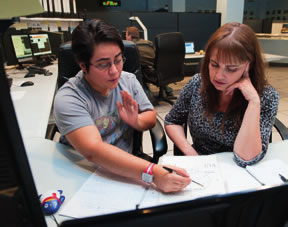
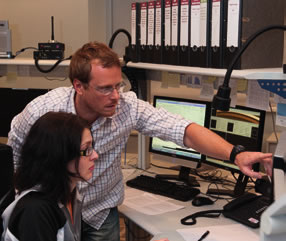

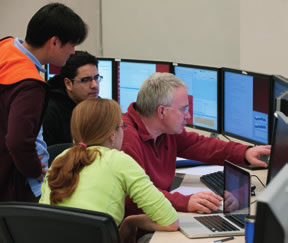
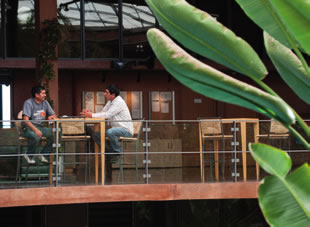
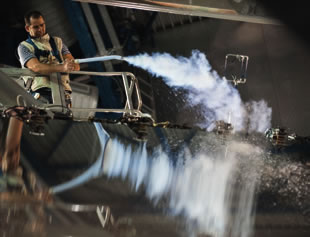
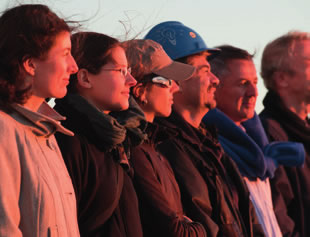
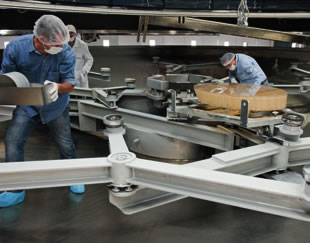
The European Organisation for Astronomical Research in the Southern Hemisphere (ESO) is the foremost intergovernmental astronomy organisation in Europe and the world's most productive ground-based astronomical observatory. ESO carries out an ambitious programme focused on the design, construction and operation of powerful ground-based observing facilities enabling astronomers to make important scientific discoveries.
ESO operates three unique world-class observing sites in northern Chile: La Silla, Paranal and Chajnantor (home to ALMA), and the ESO Headquarters are located in Garching, near Munich, Germany.
At Paranal, ESO operates the Very Large Telescope, the world's most advanced visible-light astronomical observatory, and will host and operate the southern array of the Cherenkov Telescope Array, the world's largest and most sensitive high energy gamma-ray observatory. ESO is a major partner in ALMA. On Cerro Armazones, ESO is building the 39-metre Extremely Large Telescope (ELT), which will become "the world's biggest eye on the sky" and whose operations will be fully integrated into the Paranal Observatory.
For its Directorate for Science at its Headquarters in Garching near Munich, Germany, ESO is advertising the position of
Astronomer / Instrument Project Scientist
Garching
Deadline 08/11/2024
ESO is engaged in the operation and construction of a number of optical and infrared instruments for its observatories. The Instrument Project Scientist follows the development and construction phases of new instruments supporting and nurturing its science goals, ensuring that the top-level requirements are fulfilled and that the operational scenarios are commensurate with the scientific needs and the constraints of the observatory. The development of the instruments may either be carried out by a consortium of universities and institutes, working in collaboration with ESO, or by an internal team at ESO. The Project Scientist is a prime contact for the associated consortia/institutes, as well as for the ESO science community at large when it comes to prepare for and advertise the science.
We are looking for an enthusiastic and outstanding scientist with a strong expertise in optical and/or near-infrared spectroscopy. The successful applicant will be assigned to follow one or more instruments at any given time. Two state-of-the-art instruments are presently considered: the prime objective for the Instrument Project Scientist would be to support and follow the ELT optical/near-infrared spectrograph ANDES and the integral-field spectrograph BlueMUSE for the VLT as a potential secondary project. ANDES is a high-spectral-resolution instrument for the ELT that has the potential to greatly impact our understanding of the cosmos and exoplanets. BlueMUSE is a new integral-field spectrograph, complementing the very successful MUSE spectrograph operating at bluer wavelengths. Both instruments will serve a broad community of scientists addressing topics from planets, Galactic and extragalactic systems, to the high-redshift universe and fundamental physics.
Main Duties and Responsibilities:
- Provides strong scientific leadership to the assigned instrument projects within ESO;
- Acts as the principle scientific contact to the instrument consortium;
- As a member of the ESO Astronomy Faculty, will be expected and encouraged to conduct a strong personal research programme and to participate actively in the scientific life of ESO;
- Liaises with ESO's scientific community on issues related to the instruments under their responsibility;
- Develops, owns and maintains the scientific requirements for the assigned instruments;
- Works closely with the ESO Project Managers, and System Engineers to ensure the implementation of the scientific requirements;
- Coordinates and connects with the relevant Programme Scientist(s) on the related instruments and projects;
- Supports testing, commissioning and early operations. Specifically: preparation for the science operation during design, manufacturing/assembly/integration and testing and commissioning of the instrument in close cooperation with the observatory;
- Participates in progress meetings and instrument reviews;
- Tracks the evolving requirements for the assigned instruments emerging from the community;
- Interacts closely with the observatory and data management teams on operational aspects.
The tasks are not limited to the above and a flexible approach and willingness to adapt are required.
Reports to:
Head of the Project Science Department
Key Competences and Experience
Essential Competences and Experience:
- Demonstrated experience and strong involvement in the key phases of the development of at least one astronomical instrumentation project (initial/final design, system testing, or commissioning and early operations);
- Experience with the planning, execution, analysis and publication of scientific research arising from said instrumentation;
- Active research programme and robust publication record;
- Understanding of the science requirements on instruments and strategies for their realisation;
- Ability to provide scientific and strategic vision and leadership to geographically dispersed multi-cultural/multi-disciplinary teams within a cost-constrained programme;
- Proficiency in relevant data reduction methods and tools;
- Ability to motivate and inspire others; strong influencing skills;
- Cooperative team player;
- Ability to work in a clear and structured manner producing meaningful reports to supervisors and presentations to ESO governing bodies;
- Provides clear, concise and timely oral and written communication, identifying the key issues, examining options, and proposing a way forward;
- Ability to effectively communicate at all levels and across disciplines within the organisation and with the community;
- Ability to negotiate with external scientists and instrument builders to achieve ESO's goals.
Desirable Competences and Experience:
- Significant expertise in spectroscopy (optical, near-infrared) and in particular with high-resolution spectroscopy and/or integral-field units (IFUs);
- Good knowledge of adaptive optics techniques, in particular SCAO;
- Broader experience following instrument development over most if not all phases from initial design to final commissioning.
Qualifications:
Ph.D. in astronomy, physics or equivalent
Language skills:
Excellent command of the English language is essential.
Remuneration and Contract:
We offer an attractive remuneration package including a competitive salary, comprehensive pension scheme and medical, educational and other social benefits, as well as financial help in relocating your family and support to place your child/children in daycare.
Our Salary Structure
ESO's salary structure is based upon a range of career paths which reflect the nature and level of our jobs. Each career path is made up of two or three grades which are used to further reflect experience.
Please follow this attached link for more details https://www.eso.org/public/jobs/conditions/intstaff/salary-structure/
ESO aims to support members of personnel in maintaining a good work-life balance (https://www.eso.org/public/jobs/conditions/intstaff/#work-life-balance) between their professional and private life. ESO is also committed to offering family-friendly support (https://www.eso.org/public/jobs/conditions/intstaff/#family-friendly-support), creating a work environment and policies which allow staff to balance their professional and private responsibilities through flexible working arrangements and financial support for families.
The contract is for a fixed term duration of three years and is subject to successful completion of the probation period. There may be a possibility of extension(s) subject to individual performance and organisational requirements, and as defined in the applicable policies and staff rules and regulations. For any further information, please visit ESO's conditions of employment (https://www.eso.org/public/jobs/conditions/). Please note that the contract policy and in particular the regulations concerning fixed-term and indefinite contracts are currently under review which may lead to changes in the contractual conditions applicable to this position.
Serious consideration will be given to outstanding candidates willing to be seconded to ESO on leave from their home institutions. The grade may be subject to change according to qualification and the number of years of experience.
Duty Station:
Garching near Munich, Germany, with duty trips to the ESO sites in Chile as required.
Career Path: V
Application:
If you are interested in working in areas of frontline science and technology and in a stimulating international environment, please visit http://www.eso.org for further details.
Applicants are invited to apply online at https://recruitment.eso.org/. Applications must be completed in English and should include a motivation letter, and a CV containing a publication list and a research statement. Also required are the names and contact details of three scientists familiar with your work and willing to provide a recommendation letter. Referees will be automatically invited to submit a recommendation letter by the deadline. However, applicants are strongly advised to trigger these invitations (using the web application form) well in advance of the application deadline.
Deadline for applications is 8 November 2024.
Interviews are expected to start soon after this date.
ESO Values
An important element in any successful employment relationship is harmony in values between an organisation and its people.
The ESO Values are:
ESO strives for excellence through innovation.
ESO provides outstanding services to its communities.
ESO fosters diversity & inclusion.
ESO believes in the key role of sustainability for its future.
Achieving the above are recognized as only possible on the basis of personal values and attitudes that we expect from our employees: respect, integrity, accountability, commitment, collaboration, and clear & open communication.
Applicants to any ESO role are asked to reflect on their affinity with these values and advised they may be asked about them if called for interview.
Diversity
ESO has established diversity as an important value of the Organisation, is committed to providing an equal opportunities environment and is actively seeking to promote a diverse, equitable and inclusive workforce. Please visit https://www.eso.org/public/about-eso/sustainability/dei-at-eso/ for further details.
Nationality
No nationality is in principle excluded from employment at ESO, however, recruitment preference will be given to nationals of our Member States, host states and strategic partners: Australia, Austria, Belgium, the Czech Republic, Denmark, Finland, France, Germany, Ireland, Italy, the Netherlands, Poland, Portugal, Spain, Sweden, Switzerland, the United Kingdom and Chile, irrespective of gender, age, disability, sexual orientation, ethnicity or religion.
